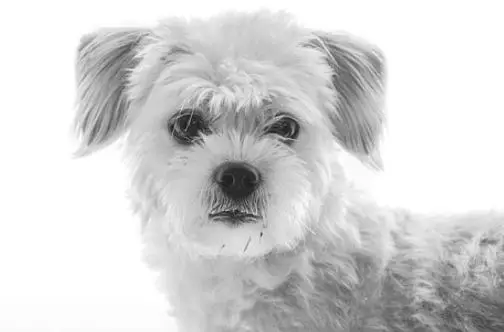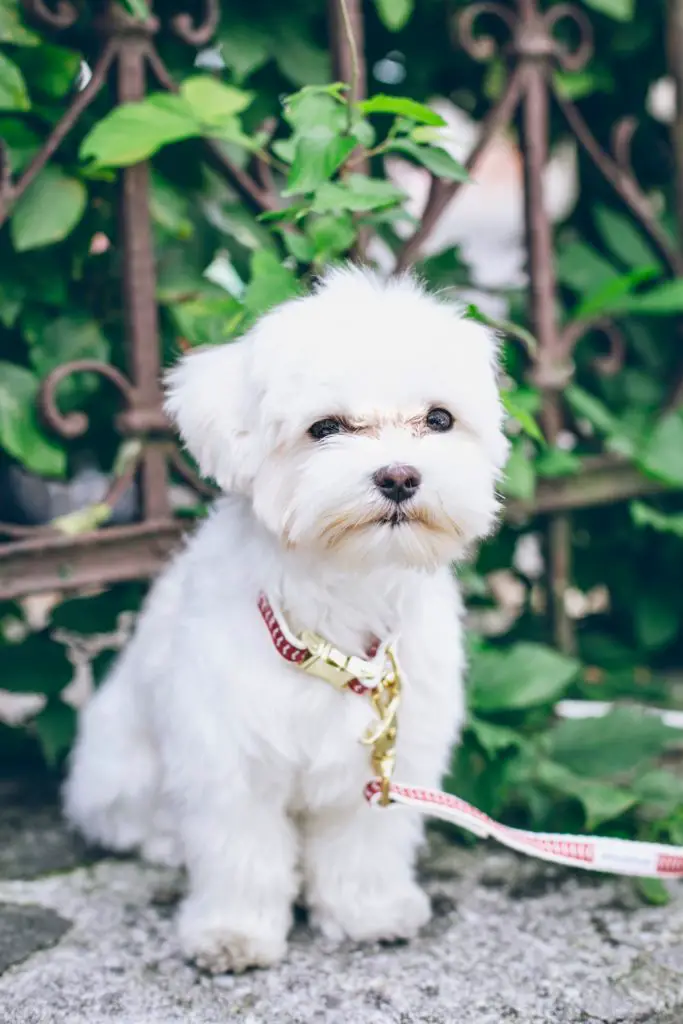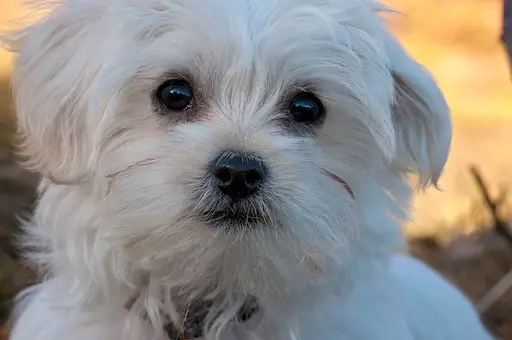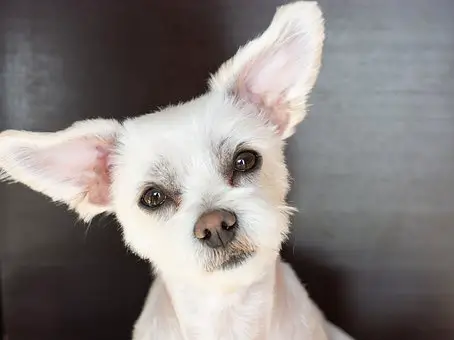Why is My Maltese losing its hair? | Maltese hair loss
A Maltese dogs hair is well known for its white color, softness and length so Maltese hair loss can be a disturbing issue for any Maltese puppy owner. Maltese dogs will lose their hair, or have their hair start to thin, when they have underlying health issues or they are under extreme stress. Luckily determining the cause of Maltese hair loss can be quite simple for a vet and most of the causes can easily be prevented and treated. If you have a Maltese dog which is suffering from hair loss or a thin coat this article will help guide you on what you can do before you have a hairless Maltese dog. If you do have a Maltese dog who is suffering hair loss the first point of call should always be your vet as they are in the best position to do a thorough diagnosis and can prescribe the correct treatment.
What are the reasons for Maltese Dog Hair Loss?
There are at least 9 main reasons or causes of Maltese hair loss. If your Maltese dog is starting to have a thin coat or is shedding their hair you may want to assess these causes and see if any of them are the cause. The reasons listed are listed in order of how easy they are treat and fix. The first few can be done at home without the need for a trip to the vet but there last few reasons on Maltese hair loss are going to require the intervention of a vet before you end up with a hairless Maltese dog.
Maltese Hair Loss Reason 1 : Fleas and Mites
Fleas and mites can affect the skin of your Maltese dog causing itching, scratching, licking and gnawing at the affected areas. Whenever the skin of your Maltese puppy is irritated there is a good chance that the hair and fur in that region will start to decline and thin. The reason being that if your Maltese is constantly licking and chewing at themselves they will be pulling out some of the hair as they do it. When this happens and continues over a long period of time your Maltese will thin out its coat and even cause bald patches on their body. Maltese dogs are especially prone to getting fleas and mites as they are so low to the ground and they usually have long luscious hair which is easy for the mites and fleas to catch a ride on. Keep in mind that fleas can jump six feet so they can easily get to your Maltese puppy from other dogs. If you suspect that fleas or mites are causing your Maltese to lose hair then there are a few things you can do:
- Flea and Mite Treatment: There are flea ointments and tablets which can be taken or used on your Maltese dog which will help to keep the flea infestation within acceptable limits. The problem with a lot of these treatments is that they kill the fleas after they have bitten the dog. For this reason its a good idea to use them and also use a flea shampoo to kill any eggs and active fleas which are on your Maltese. Using these two processes you should kill and remove all of the fleas on the dog. But there could still be fleas in the environment so the next step is to kill fleas in the home.
- Treat the house and yard for fleas: There are sprays and bug bombs which will kill all the fleas in a house or yard. These should be used as fleas will hide out of sight in the floorboards, in the carpet, in the walls and in the furniture. If you do not clear the environment your Maltese lives in of fleas and mites then you will likely just end up with new fleas on your Maltese and the irritation causing the Maltese hair loss will continue.
- Let neighbors know of the flea problem: Because fleas can move about if you have neighbors with dogs or cats they may also have fleas. if everyone near you also treats their dogs for fleas there is a much better chance of controlling the flea infestation. If your neighbors do not treat their animals you will have an ongoing battle as the fleas continue to migrate from their yard to yours. If this is the case look to use a surface spray on your border to minimize what can get from their yard to your yard. its not perfect but its better than no defense at all. When using a surface spray ensure you keep your Maltese puppy inside as per the spray instructions. it is usually for a few hours while it dries.
- Avoid public areas where other dogs congregate: Fleas can jump 6 feet so if your Maltese is near another dog it can pick up fleas from them. Dog parks are a breeding ground for fleas and they transfer from dog to dog at will when in this environment. If you have a Maltese who loses hair due to fleas you may want to avoid the dog parks and instead head to areas where there are less dogs.
- Avoid beaches: Sand is notorious breeding ground for mites that get into the skin of dogs and cause rashes and irritations. Mites will usually need some form of treatment from a vet as they are hard to see but can be tested for. You should be careful as mites can also transfer from dogs to humans and you could soon have a similar rash. Mites will affect the skin and can cause patchy fur to develop. This wil result in hair loss for the Maltese puppy around the infected area.
- Cut longer hair: White this won’t do much to help with fleas it will help with some mites and other bugs which can easily catch a ride on long Maltese hair. Shaving the Maltese will help with fleas if the infestation on your dog is really bad. The fleas will not like the short hair and will look for other dogs. Remember shaving your Maltese can be an extreme measure but isn’t a problem if your Maltese dog is not a show dog. The hair will grow back over time and can come in thicker and fuller.
If you follow the above advice on fleas you will have a good chance of minimizing and reversing any Maltese hair loss due to flea and mite bites.

Maltese Hair Loss Reason 2 : Excessive Licking
Your Maltese may lick excessively due to an irritation or infection on their skin or they may lick out of habit, stress or anxiety. Narrowing down the reason on why your Maltese is licking themselves will help to stop the excessive licking. Licking on the paws and feet is not unusual and can result in some orange staining. But excessive licking on any part of the body where they are pulling out hair, thinning hair or chewing at their skin needs to be fixed. The following suggestions will help:
- Identify and fix habitual licking: habitual licking occurs because your Maltese puppy has got into a routine and they use the licking almost mindlessly to put off boredom. They will generally do habitual licking at certain times of the day (for example after eating) and will do it for an extended period of time (30 mins or longer). If you notice your Maltese doing habitual licking you need to break the cycle by taking them for a walk or playing with them with a toy. Even just calling them over for a pat will be enough to break the cycle. You need to keep at it and try and break the cycle as much as possible otherwise the excessive licking will cause your dog hair loss.
- Identify and fix stress and Anxiety licking: Licking can be very soothing for a dog and if they are feeling anxious or stressed it can calm them down. If you notice your dog stress licks when people are over, other dogs are around or because your away from them then you need to try and fill that void with something. If you are around when they do it then go comfort them and play with them. If its separation anxiety causing the licking of the hair then you need to take your Maltese dog for a walk and exercise them just before you leave the house. This will tire them out and they will sleep instead of licking themselves while you are gone. If you don’t get on top of stress licking then you may come home one day to a hairless Maltese.
Maltese Hair Loss Reason 3 : Food
You are what you eat and this is also true for your Maltese puppy. Providing low quality cheap food can cause a range of health issues including a thinning coat, hair loss and dry skin. Good quality food for your Maltese dog should include protein, antioxidants, vitamins and Omega 3 fatty acids. The most important of these ingredients is the Omega 3 fatty acids which can be sourced from fish such as wild salmon and tuna or from certain oils such as the flax seed oil. Omega 3 fatty acids are imperative to both brain, skin and coat development and a diet lacking in Omega 3 fatty acids will definitely cause coat issues such as dry coats and a thinner coat.
Other food issues can come from allergies to the ingredients especially if they are preservatives, flavoring or coloring. As these are usually chemical based and not natural they can cause allergic reactions which may affect the skin of the Maltese dog. Anything which affects the skin of your Maltese puppy can lead to Maltese hair loss longer term. The following suggestions should help:
- Buy high quality food: While high quality food can be more expensive it will pay off in the long run with less health issues and less visits to the vet. Look for pet foods which are not grain based as these are known as fillers and will not provide the required nutrition for your Maltese puppy.
- When providing new food keep an eye on your Maltese dog for a few weeks: Anytime you provide a new food to your puppy you should keep an eye on their skin and their habits to see if they have any allergic reaction to it. This could be identified by itchy skin, red skin or you notice your Maltese puppy constantly licking themselves and being uncomfortable.If this is the case try to go back to the old food for a period of time and slowly reintroduce the new food. if the same reaction occurs then you can be sure its an allergy to one of the ingredients. Talk to your vet and they can also do tests to identify what your Maltese dog is allergic to so that you don’t have to find out by trial and error. They will also be able to provide a guide to the best dog food available on the market for your Maltese dog. But keep in mind sometimes they will just pitch the most expensive one, so ask for a few brand recommendations so they cant just pitch you the one they get the most profit from.
- Add Supplements: You can purchase supplements from a pet store for Omega 3 which can be added to your dog food. This has been scientifically proven to help restore hair and skin on dogs. It is usually provided as a liquid and you can mix it in with the evening meal each day without your Maltese dog noticing.

Maltese Hair Loss Reason 4 : Heat / Hot Spots
Heat can cause hot spots to occur on the skin of a dog and this can lead to hair loss in the affected region. Generally hot spots on a dogs skin happens during the summer and can be very irritating to your Maltese puppy. It will irritate the skin and the hair in the spot will fall out and the skin inflamed. Your Maltese dog will lick at the hot spot causing further hair loss in the region. The following suggestions should help:
- Lots of water: Ensuring that your Maltese puppy is well hydrated during the summer is important. If they become dehydrated their skin and coat will both dry out. Dehydration will lead to poorer hair quality and the hair could be much coarser. Ensure there are multiple water bowls available to your Maltese dog in various parts of the house and yard.
- Shade: If you are not home with your Maltese during the heat of the day ensure that there is enough shade available so that they do not need to lay in the hot sun. Sun can damage the hair follicles leading to Maltese hair loss. If your yard does not have share a simple large umbrella in a stand left open will provide at least some relief from the hot sun. Other options are a shaded dog house with a large opening or putting up a shade cloth using your fences.
- Air Conditioning: If its really hot ensure your Maltese dog is inside with you and put on the air conditioning. This will ensure that the temperature will stay cool enough for everyone to be comfortable. One thing to keep in mind is air conditioning can cause dehydration so make sure your Maltese puppy has lots of water to drink.
- Ointments and Sprays: If you notice a hot spot on your Maltese puppy’s skin you can get ointments and sprays that can be used to help the area heal. They will usually take away any itchiness, irritation and discomfort so that your dog will not lick the area. Talk to your vet or pet shop owner for what they recommend if you are unsure which one to use. Amazon also has a lot of options including hot spot soothing sprays.
Maltese Hair Loss Reason 5 : Hair Products
Shampoos, conditioners and other hair and skin products are all designed to be able to help the quality and cleanliness of the Maltese fur. Maltese only have one single layer of hair so its very important to ensure you use the best quality products to protect and enhance it. Poor quality shampoos and conditioners can be imbalanced during the mixing processes and this can cause the Maltese dog coat to become either too oily or too dry. These suggestions should help:
- Change Products: If you find that the Maltese hair is not looking in as good condition as you would expect then try switching to a higher quality product of dog shampoo and dog conditioner. Check reviews online from Amazon as that will help assess what others have found with certain products. Also look for products which actively promote that they will help improve the quality of your Maltese’s hair.
- Use a leave-in spray: There are sprays you can get to use after a bath which can be left in the coat and do not need to be washed out. They are there to help protect the Maltese hair from the daily impacts of the sun and the environment. Try it for a month and see if it helps.
Maltese Hair Loss Reason 6 : Allergies
Allergies are one of the most common reasons that a Maltese loses hair. There can be many triggers for allergies which affect the skin including grass, plants, pollen, mites, chemicals or food. Whenever your Maltese comes into contact or ingests an allergic substance their body will release antihistamines. The Maltese dogs body does this in order to combat the substance which it is allergic to. When the body overreacts to these allergic substances there can be side effects such as wheezing, coughing, watery eyes, runny noses and of course skin irritations. The skin irritations can turn into hair loss for your Maltese dog. Some suggestions for handling allergies include:
- Try and identify what the allergy is: If you can reduce exposure to the allergic substance it will stop the symptoms from occurring.
- Talk to your Vet: Your vet can run tests to find out what your Maltese is allergic to. This can help you minimize exposure to those items.
- Use stainless steel bowls: plastic bowls are know to cause issues for some dogs. Using a ceramic or stainless steel bowl can help.

Maltese Hair Loss Reason 7 : Hypothyroidism
Hypothyroidism is a health condition where the thyroid gland produces a low amount of the thyroid hormone. One of the most significant symptom which points to this condition is hair loss in a Maltese dog. Along with losing its hair a Maltese may also have a thinner coat and the fur which remains may become coarse, dry and brittle. Other symptoms to look out for include weight gain, skin issues and slow heart rates. See your vet if you suspect that your dog may have this condition and they will be able to do a blood test to determine if your dog is affected by the condition. The good news is that with Medication many dogs can reverse the symptoms and live a normal life instead of a life of a hairless Maltese dog. Suggestions to help with Hypothyroidism are:
- Consult with your Vet: Your vet will be able to do the correct diagnosis with blood tests. Once confirmed they will be able to explain to you what needs to be done for your Maltese dog.
- Use supplements and medication: Thyroid supplements through medication is the most common treatment method for this condition. your vet will prescribe medication to replace the thyroid hormone not being produced. In time this increase in the thyroid hormone from the supplements will allow the Maltese body to return to normal, including repairing any hair loss.
Maltese Hair Loss Reason 8 : Alopecia
If your Maltese is looking patchy and hairless in round spots then it may be due to Alopecia. Alopecia can appear quickly and will often present as round hairless patches at any spot on the Maltese coat. In extreme cases Alopecia can affect the entire coat and you end up with a thin coat or a hairless Maltese. Alopecia is caused by a variety of things such as mites. When the cause is known it is commonly referred to as Alopecia and your Vet will prescribe a treatment to fix it. If the cause is not obvious it is referred to as Alopecia X or Alopecia Unknown. Suggestions to help with Alopecia include:
- See your Vet: There are numerous causes for Alopecia so its best to get an experts advice. They will be able to run tests and provide the best advice on what to do. They will run blood tests to check for hormone imbalances and infections. They will be able to narrow down the causes such as whether its mites or fleas or a yeast infection. They will be able to determine the best treatment and let you know how long it will take to fix the hair loss.
Maltese Hair Loss Reason 9 : Skin Infections
Maltese Skin infections can occur due to scratches, bites and abrasions getting infected by dirt and germs. Any skin infection on your Maltese will likely lead to some form of hair loss even if its localized to the region of the infection. Also Yeast skin infections can be common at certain times of the year in Maltese dogs. Yeast infections are basically fungal infections. They can affect any part of your dog but are prone to ears, pads, skin folds, armpits and the neck. Symptoms of a yeast infection include redness, itchiness, inflammation, redness and sometimes a discharge from the affected area. Suggestion to help with skin infections include:
- Keep your Maltese Dog Clean: Bath your Maltese at least once a month to ensure that its coat and skin are clean. Germs and dirt build up over time so its important to wash them off regularly.
- See your Vet: Your vet will be able to give you some medication for the Skin infection on your Maltese puppy. This could be in the form of an ointment, lotion or tablet. Be sure to follow the instructions carefully.
- Avoid Areas known as sources of Skin infections: If your Maltese dog is prone to skin infections it is a good idea to avoid certain areas which are known to be more likely to cause a skin infection due to mites. This includes the beach and dog parks. Dogs share more than just friendships and some of the mites which can cause skin infections and cause Maltese dog hair loss can also be shared.

Maltese Dog Hair Loss and Your Veterinarian
If you find your Maltese dog is losing its hair one of the best pieces of advice I can give is to talk to your Veterinarian. They are the experts when it comes to assessing the cause of a Maltese dog losing its hair or a Maltese dog having a thin coat. They are able to do visual examinations of the skin, hair and can order blood tests to check what is happening inside your Maltese puppy. Always seek their advice if you are unsure on the reason for anything related to your Maltese dog especially around hair loss.
How did we go answering your questions about Maltese Hair Loss?
Did we answer all of your questions on Maltese dog hair loss?
Do you own a hairless Maltese?
Have we missed any other conditions that you know of that can lead to Maltese puppy hair loss?
We are always striving to improve our articles and be an expert in our field so if you know something we missed which may help others let us know in the comments and we will update the article. We are always striving to do our best for our readers.
Thanks for reading.

Hi, Thanks for sharing this information. I like to read your information in the blog.